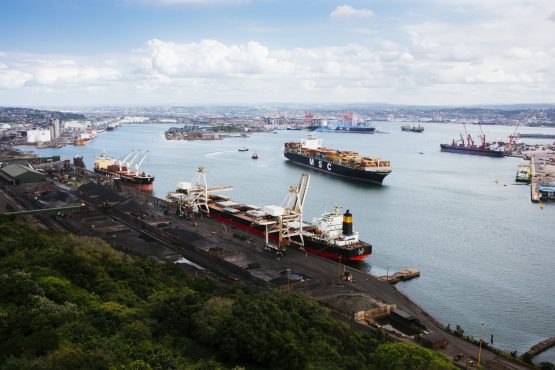International shippers have started charging ‘congestion surcharges’ due to turnaround delays at SA ports. From Moneyweb.

Some importers fear they will miss the Christmas rush due to heavy congestion at the Port of Durban – Southern Africa’s busiest container port – with ships taking 20 days or more to offload cargo in some cases. This is three or four times longer than the average.
One of the world’s largest shipping companies, MSC, has advised clients that it will start charging a ‘congestion surcharge’ due to the congestion and difficult operating conditions at SA ports.
Read: Transnet’s turnaround plan needs R122bn
MSC says customers will be charged $210 (around R3900) per 20-foot equivalent (TEU) container from 3 December 2023.
More than half the country’s container traffic is routed through the Port of Durban, where congestion is most acutely felt.
“We’ve been waiting weeks for some of our shipments to be offloaded,” says one importer who asked not to be named.
“You can see the number of ships parked off the coast of Durban has gotten longer and longer as we approach Christmas.”
Port inefficiency
Port inefficiency is blamed for the slow turnaround. While the performance of South Africa’s ports has improved in recent years, the container terminals at Durban and Ngqura were ranked 365 and 361 respectively out of 370 ports worldwide by the World Bank in 2022.
As a result of the inefficiency of these terminals, cargo is increasingly being diverted to Maputo and Luanda, resulting in a permanent loss of export traffic for SA, according to the Department of Transport’s recently published Freight Logistics Roadmap.
Read: Textainer shares spike 41% on $7.4bn Stonepeak takeover deal
Some importers believe a labour go-slow is partly to account for the increased congestion, as there is resistance among elements within the trade union movement to plans to introduce private sector operators on some port terminals.
Transnet has denied this, saying there is no go-slow.
“Transnet Port Terminals (TPT) has been advised of the congestion fee that shipping lines have imposed on customers importing general cargo as a result of delays experienced across container terminals in South Africa,” said TPT in response to Moneyweb enquiries.
Read: SA wants to hand operation of rail, ports to business after $27bn loss
Transnet selects Philippines-headquartered port operator for Durban Pier 2
“In response, the company this month introduced a new approach to improving productivity – deploying industrial engineers to maximise berth performance [at] all container terminals. In addition, TPT has, with immediate effect, started scouring second-hand cargo handling equipment as a temporary measure to assist with the short-term challenges at the terminals while simultaneously engaging with original equipment manufacturers on new fleet replacements in the medium term.”
TPT has also introduced 24-hour maintenance across all its terminals to boost productivity.
The current model of vertical integration in rail and ports has largely prevented competitive forces from reaching these markets, preventing efficiency gains and limiting private investment in operations.
“In effect, a vertically integrated firm cannot be expected to effectively foster competition in its downstream markets without significant regulatory oversight and/or structural interventions,” says the Freight Logistics Roadmap.
In July, it was announced that Philippines-based International Container Terminal Services had been chosen as the preferred bidder for a 25-year concession to run the Durban Container Terminal, which handles over half of SA’s total port traffic.